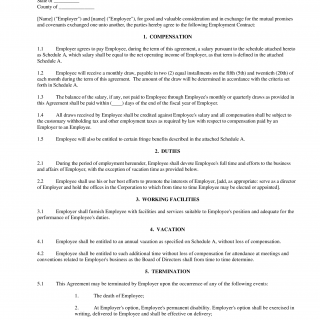Employment Contract
Employment contract is an agreement to the terms and conditions of employment – agreed by both the employer and employee. In principle, a contract is created as soon as a person agrees to work for the employer whom may have previously outlined the conditions of employment.
Employers and employees are free to negotiate and agree on the terms and conditions of employment (with reference to a company’s own system of compensation and benefits) provided that these terms do not violate the provisions of the Employment Ordinance (EO). If in doubts, they should consult legal advice.
In accordance with the EO, employers are required to provide employees with a copy of their written employment contract. In addition, employers should also consult their employees and obtain their consent before making any subsequent change to the terms of the employment contract.
Employment Contract Structure:
- Names of both the employer and employee
- Starting date of the employee
- Job title and description
- Address(es) of the workplace(s)
- Details of pay, including hourly rate/salary and pay frequency (weekly/monthly)
- Hours worked per week
- Holiday entitlement
- Sickness entitlement
- Details of any pension schemes
- If the employee is to work overseas, specify the period of overseas work and the currency of remuneration
- Grievance arrangements
- Termination of contract notice
- Redundancy procedures
- Disciplinary procedures
- Signatures of both the employer and employee
Types of Employment:
- Permanent/ongoing employment (full-time or part-time)
- Temporary or fixed-term employment (full-time or part-time) for a specified period
- Casual employment (full-time or part-time)
Reasons for changing an employment contract
An employer may need to make changes to working practices due to economic circumstances, such as business reorganization, relocation, or new laws and regulations. Changes may include:
- Rates of pay
- Working hours (e.g. longer or shorter hours, different days)
- Duties and responsibilities
- Immediate supervisor's duties and responsibilities
- Work location
Employers may also need to make changes to correct mistakes in the contract or as a disciplinary measure, such as demotion or pay cut. Check the disciplinary procedure to ensure compliance.
Whether you're a job seeker looking for your first role or an experienced professional negotiating a new contract, understanding the different types of employment contracts is important. Employment contracts outline the terms and conditions of employment between an employer and employee, including the length of employment, job duties, salary, benefits, and termination conditions. In this list, we've compiled some common types of employment contracts to help you better understand your options and make informed decisions about your career.
- Permanent Contract: This is a standard form of a contract that offers an employee ongoing employment with the company. It typically includes details such as job title, job description, salary, benefits, and terms of termination.
- Fixed-Term Contract: This type of contract specifies a set period of time during which the employee will work for the employer. Once the term expires, the employment will end automatically, unless both parties agree to extend it.
- Part-Time Contract: A part-time contract specifies the number of hours or days an employee is expected to work per week. The terms and conditions of employment, including pay and benefits, are proportional to the hours worked.
- Casual Contract: Casual contracts are typically used for temporary or seasonal work, where the employer may need workers on an irregular basis. The contract outlines the specific terms of employment, including hourly rate and duration of employment.
- Freelance Contract: This type of contract is often used for independent contractors who provide services to a company on a project basis. The contract outlines the scope of work, payment terms, and deadline for completion.
- Zero-Hours Contract: This type of contract is flexible in nature and does not guarantee any minimum hours of work. Workers can be called upon at short notice to work when needed, but they are not obliged to accept any work offered.
- Apprenticeship Contract: This type of contract is designed to offer training and practical experience to an individual seeking to learn a skill or profession. The contract outlines the terms of the apprenticeship, including duration, pay, and the skills to be taught.

